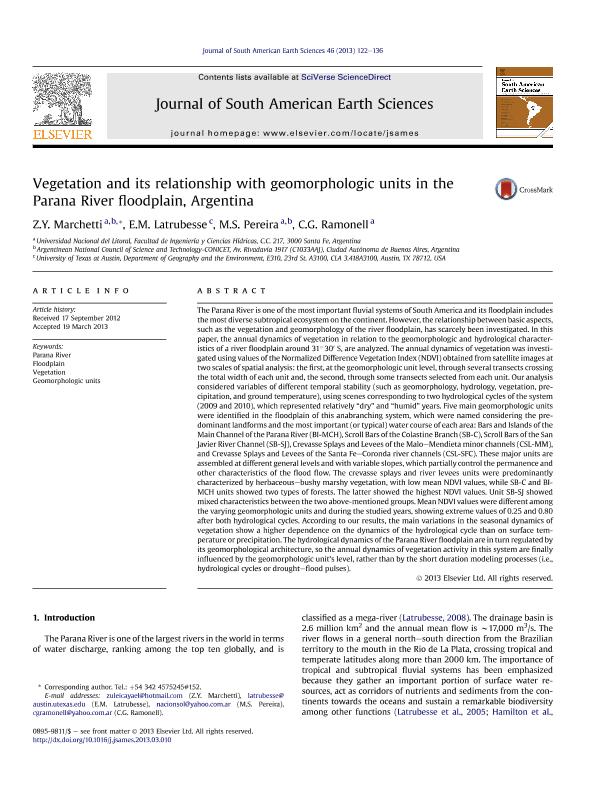Mostrar el registro sencillo del ítem
dc.contributor.author
Marchetti, Zuleica Yael

dc.contributor.author
Latrubesse, Edgardo Manuel

dc.contributor.author
Pereira, María Soledad

dc.contributor.author
Ramonell, Carlos Guillermo

dc.date.available
2016-07-07T20:24:00Z
dc.date.issued
2013-10
dc.identifier.citation
Marchetti, Zuleica Yael; Latrubesse, Edgardo Manuel; Pereira, María Soledad; Ramonell, Carlos Guillermo; Vegetation and its relationship with geomorphologic units in the Parana River floodplain, Argentina; Elsevier; Journal of South American Earth Sciences; 46; 10-2013; 122-136
dc.identifier.issn
0895-9811
dc.identifier.uri
http://hdl.handle.net/11336/6408
dc.description.abstract
The Parana River is one of the most important fluvial systems of South America and its floodplain includes the most diverse subtropical ecosystem on the continent. However, the relationship between basic aspects, such as the vegetation and geomorphology of the river floodplain, has scarcely been investigated. In this paper, the annual dynamics of vegetation in relation to the geomorphologic and hydrological characteristics of a river floodplain around 31° 30′ S, are analyzed. The annual dynamics of vegetation was investigated using values of the Normalized Difference Vegetation Index (NDVI) obtained from satellite images at two scales of spatial analysis: the first, at the geomorphologic unit level, through several transects crossing the total width of each unit and, the second, through some transects selected from each unit. Our analysis considered variables of different temporal stability (such as geomorphology, hydrology, vegetation, precipitation, and ground temperature), using scenes corresponding to two hydrological cycles of the system (2009 and 2010), which represented relatively “dry” and “humid” years. Five main geomorphologic units were identified in the floodplain of this anabranching system, which were named considering the predominant landforms and the most important (or typical) water course of each area: Bars and Islands of the Main Channel of the Parana River (BI-MCH), Scroll Bars of the Colastine Branch (SB-C), Scroll Bars of the San Javier River Channel (SB-SJ), Crevasse Splays and Levees of the Malo–Mendieta minor channels (CSL-MM), and Crevasse Splays and Levees of the Santa Fe–Coronda river channels (CSL-SFC). These major units are assembled at different general levels and with variable slopes, which partially control the permanence and other characteristics of the flood flow. The crevasse splays and river levees units were predominantly characterized by herbaceous–bushy marshy vegetation, with low mean NDVI values, while SB-C and BI-MCH units showed two types of forests. The latter showed the highest NDVI values. Unit SB-SJ showed mixed characteristics between the two above-mentioned groups. Mean NDVI values were different among the varying geomorphologic units and during the studied years, showing extreme values of 0.25 and 0.80 after both hydrological cycles. According to our results, the main variations in the seasonal dynamics of vegetation show a higher dependence on the dynamics of the hydrological cycle than on surface temperature or precipitation. The hydrological dynamics of the Parana River floodplain are in turn regulated by its geomorphological architecture, so the annual dynamics of vegetation activity in this system are finally influenced by the geomorphologic unit's level, rather than by the short duration modeling processes (i.e., hydrological cycles or drought–flood pulses).
dc.format
application/pdf
dc.language.iso
eng
dc.publisher
Elsevier

dc.rights
info:eu-repo/semantics/openAccess
dc.rights.uri
https://creativecommons.org/licenses/by-nc-nd/2.5/ar/
dc.subject
Parana River
dc.subject
Floodplain
dc.subject
Vegetation
dc.subject
Geomorphologic Units
dc.subject.classification
Geociencias multidisciplinaria

dc.subject.classification
Ciencias de la Tierra y relacionadas con el Medio Ambiente

dc.subject.classification
CIENCIAS NATURALES Y EXACTAS

dc.title
Vegetation and its relationship with geomorphologic units in the Parana River floodplain, Argentina
dc.type
info:eu-repo/semantics/article
dc.type
info:ar-repo/semantics/artículo
dc.type
info:eu-repo/semantics/publishedVersion
dc.date.updated
2016-07-06T15:46:19Z
dc.journal.volume
46
dc.journal.pagination
122-136
dc.journal.pais
Países Bajos

dc.journal.ciudad
Amsterdam
dc.description.fil
Fil: Marchetti, Zuleica Yael. Universidad Nacional del Litoral. Facultad de Ingeniería y Ciencias Hídricas; Argentina. Consejo Nacional de Investigaciones Científicas y Técnicas. Centro Científico Tecnológico Santa Fe; Argentina
dc.description.fil
Fil: Latrubesse, Edgardo Manuel. University of Texas at Austin; Estados Unidos
dc.description.fil
Fil: Pereira, María Soledad. Universidad Nacional del Litoral. Facultad de Ingeniería y Ciencias Hídricas; Argentina. Consejo Nacional de Investigaciones Científicas y Técnicas. Centro Científico Tecnológico Santa Fe; Argentina
dc.description.fil
Fil: Ramonell, Carlos Guillermo. Universidad Nacional del Litoral. Facultad de Ingeniería y Ciencias Hídricas; Argentina
dc.journal.title
Journal of South American Earth Sciences

dc.relation.alternativeid
info:eu-repo/semantics/altIdentifier/url/http://www.sciencedirect.com/science/article/pii/S0895981113000473
dc.relation.alternativeid
info:eu-repo/semantics/altIdentifier/doi/http://dx.doi.org/10.1016/j.jsames.2013.03.010
dc.relation.alternativeid
info:eu-repo/semantics/altIdentifier/doi/10.1016/j.jsames.2013.03.010
Archivos asociados
